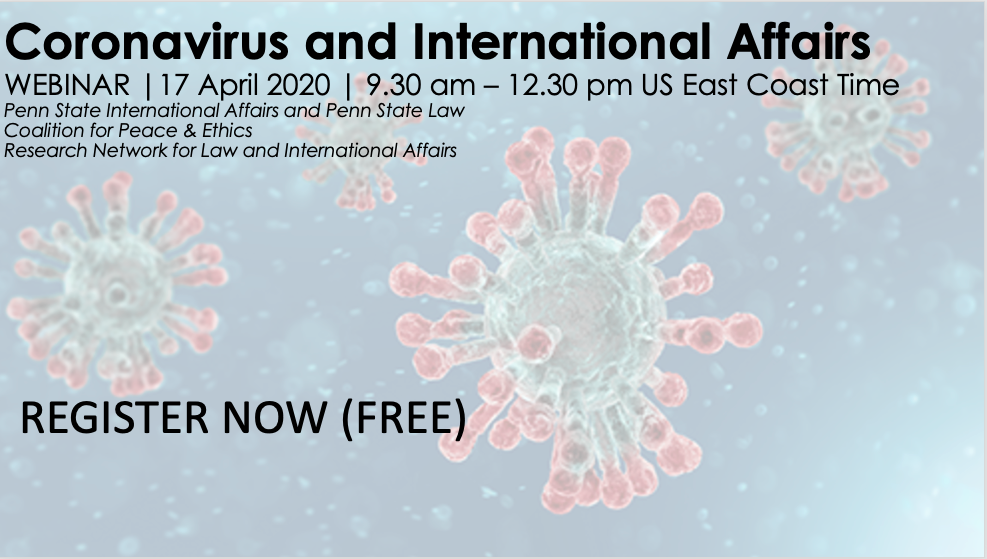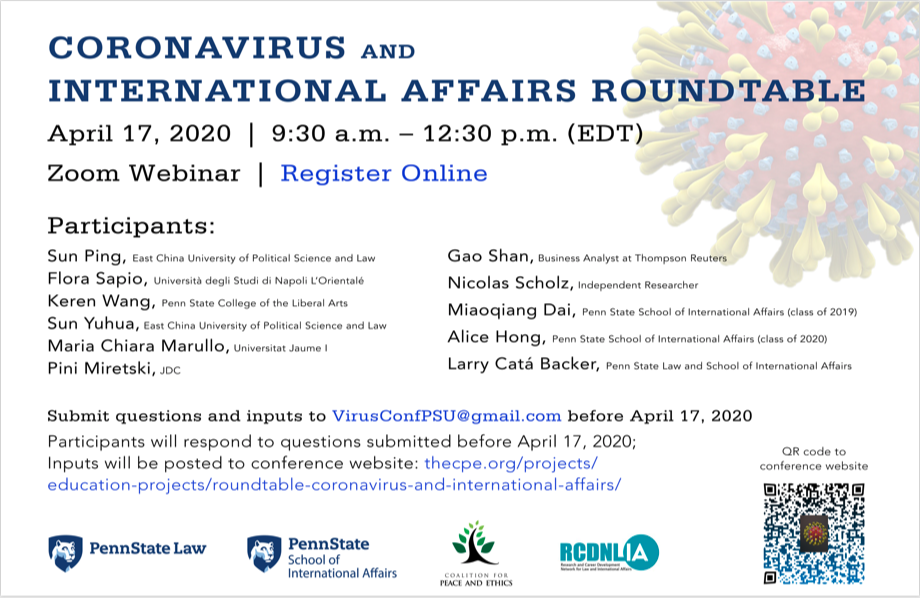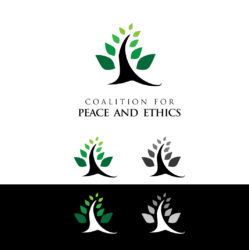17 April 2020

Register HERE
(REGISTRATION REQUIRED BUT FREE)
Press Release

Roundtable Information (New Date)
Place: On Line WEBINAR
Date: 17 April 2020
Time: 9.30 a.m. – 12.30 p.m.
Conference/Roundtable WEBINAR Description
Access a short description of the Conference/Roundtable WEBINAR program by clicking above.
Conference/Roundtable WEBINAR Concept Note
Access the Conference/Roundtable WEBINAR Concept Note by clicking able.
Participants
The Conference/Roundtable brings together academics, practitioners, and civil society actors from China, the United States, Spain, Germany, Israel, and Italy, each bringing a unique national and regional perspective to the discussion of COVID-19 in its transnational effects. These effects are simultaneously local (manifesting in specifically contextual ways) and global, manifesting in tendencies to convergence in some respects of principles, practices, and outlook.
Participant and Contributor Interviews (CPE YouTube Channel)
In the days leading up to the Conference/Roundtable, CPE had an opportunity to sit with some of the Conference participants as well as some important Conference participants for short interviews. The interviews may be accessed here:
Flora Sapio Interview (COVID-19 in Italy; migration, and global economic effects)
Larry Catá Backer Interview (rationale for focusing in international rather than national approaches to the COVID-19 pandemic; the semiotics of the virus in terms of imposing meaning through nationality, through morality, and through responsibility))
Yuri Hernandez Gonzalez Interview (COVID-19 in Cuba and the Caribbean; the role of Cuban medical diplomacy abroad; economic repercussions respecting pharma and the tourist sector)
Alice Hong Interview (COVID-19 from the perspective of a foreign student at a US university; reflections on the way that the great drivers of international relations produce personal and individual effects)
GAO Shan interview (GAO Shan speaks about life under COVID-19 across the US-China divide. Dr. Gao grew up in Wuhan where his parents still live and work. He is currently working in the US Midwest. He speaks to us about the situation in Wuhan from the perspective of an insider from the outside and then relates those experiences in thinking about the differences in the way that the pandemic is experienced in Wuhan and in the US Midwest)
Keren Wang interview (Dr. Wang, who researches in the areas of rhetoric and discourse, provides a superb interview that started with a wide ranging discussion of the difference between the US and China in terms of their response to the Pandemic. He then considered how that response and this pandemic has shaped its own discourse in both countries, contrasting the way that discussion is constructed by officials, the media, and among common people )
Jonathan Kiwana interview ( a lawyer and constitutional scholar in Uganda (and a former student), he speaks to the way that Uganda and neighboring states confronted COVID-19 and the pandemic. He spoke as well to the substantial differences in approach. He also considered the role of the African Union and IFIs, as well as the role of Multinational Enterprises in meeting the COVID-19 challenge. He ends with a reflection on the post pandemic future of international relations from an African perspective)
Pini Miretski interview (speaks to the state, technology and the response of Russia, Ukraine, Israel, Turkmenistan, and Belarus in meeting the challenges of the COVID-19 pandemic. He first considers the current responses among these states form a comparative perspectives, and then considers the role of technology in each nation’s response. He ends by examining some positive aspects–the spike in volunteerism in these states, as well as the role of business and civil society)
Nicolas Scholz interview (spoke to the situation in Germany, a federal Republic with its own brand of center-periphery issues that are different from that between the US States and federal government. He spoke as well to COVID-19 from a European historical perspective, situating it within a century of shocks that adds perspective. And he considered the implications of COVID19 on social cohesion pulled between nationalism and globalization. Lastly he considered the way that COVID-19 might play a role in the contradictions between politics and administration, reacting to the debating point: does COVID-19 inaugurate the age of the technocrat and institutional administrator displacing the political actors at the center of the organization of the state)
Bethany Salgado interview (spoke to issues of the challenges of COVID-19 for business with particular focus on the consumer products industry. She considered COVID-19’s effects on supply chains, on supply chain diversification, and on the possibility of returning supply chains “home.” Lastly she spoke about business and human rights in two respects: the first was relating to corporate responsibility for the integrity and welfare of stakeholders in its supply chain; the second touched on the responsibility of enterprises for worker protection in the form of PPE and obligations to sanitize workplaces).
Live streaming Information
Once registered you will receive information via email about logging into the event.
Submit Questions:
VirusConfPSU@gmail.com (please use heading “Roundtable Question”). Questions submitted before the Roundtable will be distributed to the participants for response.
Questions Submitted
Questions submitted may be accessed by clicking above.
Request for Inputs:
The Roundtable organizers seek inputs from interested parties respecting the seven conference issues and theme; the Organizers are especially interested in inputs respecting personal experiences in the context of the coronavirus. Inputs will be published to this website. Please submit inputs via email to VirusConfPSU@gmail.com (please use heading “Roundtable Inputs”).
Inputs Submitted
Inputs posted may be accessed by clicking above.
Conference Program
Program available here
Conference Recording
Roundtable Recording may be accessed here
Resources: Coronavirus and Institutional Responses
Roundtable organizers have included resources that may be of interest. These focus on the legal, policy, institutional, economic, and normative effects of coronavirus. Special emphasis is placed on materials respecting institutional responses to coronavirus t suggests the evolving state of risk assessment (both legal and business risk) among public and private institutions as they seek to manage their operations in the face of the challenges of disease.

